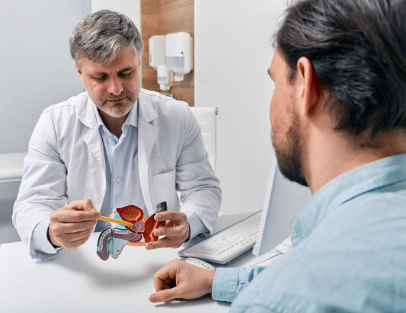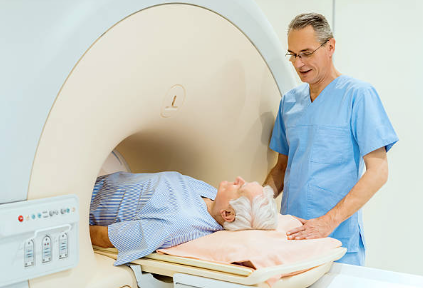Men over 40 – How to Beat Benign Prostatic Hyperplasia (BPH)
 Beat Benign Prostatic Hyperplasia (BPH): The Ultimate Guide for Men Over 40
Beat Benign Prostatic Hyperplasia (BPH): The Ultimate Guide for Men Over 40
Understanding and Treating Benign Prostatic Hyperplasia
Frustrated by Prostate Problems? You’re Not Alone
As a man over 40, you might start to notice some changes in how you urinate. Frequent bathroom trips, a weak stream, the feeling that you can’t quite empty your bladder – these are all signs of benign prostatic hyperplasia (BPH). BPH is incredibly common (affecting over 50% of men by age 60), and it can seriously impact your quality of life. But don’t lose hope! There are options.
What is Benign Prostatic Hyperplasia (BPH)?
Your prostate is a walnut-sized gland located below your bladder. It’s part of your reproductive system, and its main job is to produce some of the fluid that makes up semen. Benign prostatic hyperplasia (BPH), also known as prostate gland enlargement, is a common condition in men as they age. It’s essentially a non-cancerous enlargement of the prostate.
As your prostate grows, it can press on your urethra (the tube that carries urine out of your body). This squeezing causes a whole host of bothersome symptoms that can negatively impact your life.
Understanding the Causes of Benign Prostatic Hyperplasia (BPH)
While the exact causes of BPH aren’t fully understood, experts believe it’s linked to hormonal changes that happen as men age. Specifically, changes in the balance of testosterone and estrogen seem to play a role.
Is Benign Prostatic Hyperplasia (BPH) a Serious Risk?
While BPH itself isn’t cancerous, it can lead to problems like urinary tract infections, bladder damage, or kidney damage if left untreated. So getting proper medical treatment for benign prostatic hyperplasia is crucial. Your doctor can work with you to understand your benign prostatic hyperplasia treatment guidelines and develop a plan to manage your symptoms.
Signs You Shouldn’t Ignore: Symptoms of BPH
- Frequent need to urinate, especially at night
- Weak urine flow or trouble starting
- Feeling like you can’t completely empty your bladder
- Dribbling at the end of urination
- Urgent need to go, sometimes with leakage
Don’t Let It Rule Your Life: Complications of Benign Prostatic Hyperplasia
Think those bathroom trips are just an annoyance? Think again. Untreated BPH doesn’t just impact your sleep, it can lead to some serious problems that make life a whole lot tougher. Here’s what you need to know:
-
Urinary Tract Infections (UTIs): The Nightmare You Don’t Want Incomplete bladder emptying creates a breeding ground for harmful bacteria. UTIs bring a host of misery – burning, urgency, fever – and those infections can even spread to your kidneys.
-
Bladder Stones: More Than Just Uncomfortable As if BPH isn’t enough, when urine sits too long in your bladder, minerals can crystallize into hard bladder stones. These cause pain, block urine flow, and can even lead to infection.
-
Kidney Damage: The Silent Threat Over time, the constant pressure buildup from BPH can damage your kidneys, silently impairing their ability to filter waste from your blood. This is a serious complication with a long-term impact on your health.
-
Acute Urinary Retention: The BPH Emergency In the worst-case scenario, you may suddenly lose the ability to urinate at all. This is a medical emergency, requiring immediate catheterization to drain your bladder. It’s a scary reminder that BPH isn’t something to ignore.
The Bottom Line: Don’t Gamble With Your Health
These complications aren’t guaranteed to happen to everyone with BPH. But the risk increases the longer you postpone treatment. Don’t brush off those urinary symptoms as “just getting older.” Protect yourself from the potential damage BPH can cause. Talk to your doctor about the wide range of options available to get back in control.
Ready to Take Control? Your Guide to Medical Treatment for Benign Prostatic Hyperplasia
The good news is there’s a range of effective treatments for BPH, from simple lifestyle adjustments to medications and even minimally invasive procedures.
Watchful Waiting: Your First Line of Defense
Not every case of BPH needs aggressive treatment. If your symptoms are mild, your doctor may recommend “watchful waiting,” which means monitoring your condition while making lifestyle changes like:
- Limiting fluids at night
- Avoiding caffeine and alcohol
- Double-voiding (trying to go again a few minutes after urinating)
 When Lifestyle Changes Aren’t Enough: Medications for BPH
When Lifestyle Changes Aren’t Enough: Medications for BPH
If tweaks to your daily habits aren’t cutting it, and those bathroom trips are seriously impacting your life, it’s time to explore the power of medication. There are two main categories that work in different ways:
Alpha-Blockers: The Quick Relief Option
Think of alpha-blockers like opening a jammed door. They relax the smooth muscles in your prostate and bladder neck, helping the urine flow more freely. They kick in relatively quickly, making them a great choice if you’re looking for symptom relief fast.
Common examples include:
- Tamsulosin (Flomax): A popular and well-established choice.
- Alfuzosin (Uroxatral): Similar to tamsulosin with potential benefits in men who also have high blood pressure.
- Silodosin (Rapaflo): A slightly more targeted option, may have fewer blood pressure-related side effects.
5-Alpha Reductase Inhibitors: The Long-Term Prostate Shrinker
These medications tackle the root of the problem – the overgrowth of your prostate. They work by blocking an enzyme involved in converting testosterone to a form that fuels prostate enlargement. The catch: It can take several months to see the full benefit, so you’ll need some patience.
Here are the players in this category:
- Finasteride (Proscar): A tried-and-true option for treating BPH
- Dutasteride (Avodart): Similar to finasteride, might be slightly more potent.
The Combo Approach: When One Isn’t Enough
Sometimes, your doctor might recommend combining an alpha-blocker and a 5-alpha reductase inhibitor. This double-punch can be even more effective, especially in men with significantly enlarged prostates.
Important Note: Side Effects and Talking to Your Doctor
Like any medication, those used for BPH have potential side effects. Alpha-blockers can sometimes cause dizziness or low blood pressure, while 5-alpha reductase inhibitors can sometimes impact sexual function. It’s essential to have an open and honest conversation with your doctor about potential risks and benefits. They’ll help you determine which type of medication (or combination) is the right fit for you.
Minimally Invasive Procedures: Exploring Advanced Options
For men who don’t get enough relief from medication, or have severe BPH, there are innovative procedures like:
- TUMT: Uses microwaves to shrink prostate tissue.
- UroLift: Small implants lift and hold enlarged prostate tissue away from the urethra.
- Rezum: Uses steam to shrink the prostate.
 Surgical Options: For the Most Severe Cases
Surgical Options: For the Most Severe Cases
While most men won’t need it, surgery remains the gold standard for very large prostates or when other options fail. The most common type is:
- TURP (Transurethral Resection of the Prostate): Portions of the enlarged prostate are surgically removed.
The Right Plan for You: Understanding Benign Prostatic Hyperplasia Treatment Guidelines
Choosing the best treatment depends on your individual needs. Your doctor will consider:
- The size of your prostate
- Severity of your symptoms
- Your age and overall health
- Any potential side effects of treatment
Expert Care Matters: Your Nursing Care Plan for BPH
When you’re dealing with BPH, nurses aren’t just there to take your blood pressure – they’re your partners in managing this condition for the long haul. A good nursing care plan goes beyond the basics, providing a wide range of support:
-
Empowering You with Knowledge: Understanding BPH is the first step to taking control. Your nurse will break down those complicated medical terms, explain how your prostate works, and clarify why those symptoms are happening. They’ll also be there to answer your questions, and those of your loved ones, so everyone feels informed.
-
Your Symptom Watchdogs: Nurses are skilled at keeping track of how you’re doing –tracking your urination habits, asking about any pain, and watching for potential side effects from medication. This helps your doctor adjust your plan as needed, maximizing your relief.
-
Lifestyle Change Cheerleaders: Small changes can make a big difference with BPH. Nurses can provide practical tips, resources, and even help you set achievable goals – maybe it’s cutting down on those evening beers or trying those Kegel exercises. They’ll be there to offer motivation and track your progress.
-
Preparing You for the Next Step: If procedures or surgery are on the horizon, your nurse will walk you through the process. They’ll explain what to expect, how to prepare, and address any fears or anxieties you might have.
-
Don’t Forget Your Emotional Well-being: BPH can take a mental and emotional toll. Frustration, worry, maybe even embarrassment – these are all normal. Nurses provide a safe space to talk about these feelings, offering support and connecting you with resources when needed.
The Takeaway: Nurses Are Your BPH Teammates
Think of your nurse as your guide, teacher, and advocate. Their expertise and support are key to navigating this condition. Don’t be afraid to ask questions, lean on their knowledge, and let them know how BPH is affecting your life. This partnership can make all the difference in your BPH journey.
BPH Frequently Asked Questions (FAQs)
FAQ 1. I’m a man over 50, and I’m starting to have some urinary problems. Could it be BPH?
It’s definitely possible! BPH is incredibly common in older men. However, other conditions can cause similar symptoms, so it’s important to see your doctor for a proper diagnosis. They’ll ask about your symptoms and may perform a physical exam or tests.
FAQ 2. Can I just ignore BPH and hope it goes away on its own?
Unfortunately, BPH is progressive. Ignoring it often makes things worse and increases your risk of complications like urinary tract infections, bladder stones, or even kidney damage. It’s best to see a doctor and discuss treatment options early on.
FAQ 3. What’s the difference between alpha-blockers and 5-alpha reductase inhibitors?
Both types of medications treat BPH, but they work differently. Alpha-blockers provide quick relief by relaxing the muscles in your prostate and bladder. 5-alpha reductase inhibitors take longer to work, but they actually shrink the prostate over time.
FAQ 4. I’m worried about the side effects of BPH medication, what should I do?
It’s natural to have concerns about side effects! Have a candid conversation with your doctor. They’ll weigh the potential risks with the likely benefits and help you choose the treatment that’s right for you.
FAQ 5. How can a nurse help me manage BPH?
Nurses play a huge role in BPH care! They provide education on BPH, monitor your symptoms, help you manage any medication side effects, offer tips for lifestyle changes, prepare you for any procedures, and provide much-needed emotional support along the way.
Disclaimer:
The information provided in this article is intended for general knowledge and informational purposes only, and does not constitute medical advice. It is essential to consult a qualified healthcare professional for diagnosis and treatment of any health condition. Never disregard professional medical advice or delay in seeking it because of something you have read in this article.


